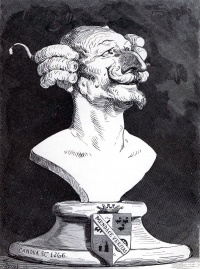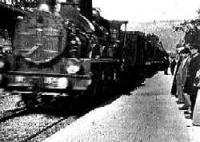History of fiction
From The Art and Popular Culture Encyclopedia
(Difference between revisions)
| Revision as of 14:07, 19 January 2022 Jahsonic (Talk | contribs) ← Previous diff |
Current revision Jahsonic (Talk | contribs) |
||
| Line 2: | Line 2: | ||
| {| class="toccolours" style="float: left; margin-left: 1em; margin-right: 2em; font-size: 85%; background:#c6dbf7; color:black; width:30em; max-width: 40%;" cellspacing="5" | {| class="toccolours" style="float: left; margin-left: 1em; margin-right: 2em; font-size: 85%; background:#c6dbf7; color:black; width:30em; max-width: 40%;" cellspacing="5" | ||
| | style="text-align: left;" | | | style="text-align: left;" | | ||
| - | "The [[history of fiction|History of Fiction]], therefore, becomes, in a considerable degree, interesting to the [[philosopher]], and occupies an important place in the history of the progress of society. By contemplating the [[fables]] of a people, we have a successive delineation of their prevalent modes of thinking, a picture of their [[feelings]] and [[tastes]] and [[habits]]. In this respect [[prose fiction]] appears to possess advantages considerably superior either to [[history]] or [[poetry]]. In history there is too little individuality; in poetry too much effort, to permit the poet and historian to portray the manners living as they rise."--''[[History of Fiction (John Colin Dunlop)|History of Fiction]]'' (1814) by John Colin Dunlop | + | "The [[history of fiction|History of Fiction]], therefore, becomes, in a considerable degree, interesting to the [[philosopher]], and occupies an important place in the history of the progress of society. By contemplating the [[fables]] of a people, we have a successive delineation of their prevalent modes of thinking, a picture of their [[feelings]] and [[tastes]] and [[habits]]. In this respect [[prose]] [[fiction]] appears to possess advantages considerably superior either to [[history]] or [[poetry]]. In history there is too little individuality; in poetry too much effort, to permit the poet and historian to portray the manners living as they rise."--''[[History of Fiction (John Colin Dunlop)|History of Fiction]]'' (1814) by John Colin Dunlop |
| |} | |} | ||
| [[Image:Arrival of a Train at La Ciotat, 1895.jpg|thumb|right|200px|This page '''''{{PAGENAME}}''''' is part of the [[fiction]] series.<br>Illustration: screen shot from ''[[L'arrivée d'un train en gare de La Ciotat]]'']] | [[Image:Arrival of a Train at La Ciotat, 1895.jpg|thumb|right|200px|This page '''''{{PAGENAME}}''''' is part of the [[fiction]] series.<br>Illustration: screen shot from ''[[L'arrivée d'un train en gare de La Ciotat]]'']] | ||
| Line 13: | Line 13: | ||
| # [[Cinema]] replaces the novel and theatre as primary source of fiction | # [[Cinema]] replaces the novel and theatre as primary source of fiction | ||
| # [[Home video]] replaces the [[cinema]] | # [[Home video]] replaces the [[cinema]] | ||
| - | # [[Gaming]] puts the audience in the [[first person perspective]] | + | # [[Video game |Gaming]] puts the audience in the [[first person perspective]] |
| - | == History of fiction == | ||
| - | |||
| - | * [[History of literature]] | ||
| - | * [[History of film]] | ||
| - | * [[History of theatre]] | ||
| - | |||
| - | === By content === | ||
| - | :''[[History of genre fiction]]'' | ||
| - | |||
| - | * [[History of detective fiction]] | ||
| - | * [[History of fantasy fiction]] | ||
| - | * [[History of mystery fiction]] | ||
| - | * [[History of science fiction]] | ||
| - | |||
| - | === By form === | ||
| - | * [[History of comics]] | ||
| - | * [[History of fables]] | ||
| - | * [[History of fairy tales]] | ||
| - | * [[History of film]] | ||
| - | * [[History of folklore]] | ||
| - | * [[History of novels]] | ||
| - | * [[History of plays]] | ||
| - | * [[History of poetry]] | ||
| - | * [[History of serials]] | ||
| - | * [[History of short stories]] | ||
| - | * [[History of situation comedies]] | ||
| - | * [[History of video games]] | ||
| - | |||
| - | === By length === | ||
| - | * [[History of flash fiction]] | ||
| - | * [[History of short stories]] | ||
| - | * [[History of novelettes]] | ||
| - | * [[History of novellas]] | ||
| - | * [[History of novels]] | ||
| - | * [[History of epic poetry]] | ||
| ==See also== | ==See also== | ||
| - | *[[History of Fiction (John Colin Dunlop)]] | + | *[[History of Fiction (John Colin Dunlop)|History of Fiction]] (1814) by John Colin Dunlop |
| {{GFDL}} | {{GFDL}} | ||
Current revision

Doré's caricature of Münchhausen, a portrait bust of Baron Münchhausen
|
"The History of Fiction, therefore, becomes, in a considerable degree, interesting to the philosopher, and occupies an important place in the history of the progress of society. By contemplating the fables of a people, we have a successive delineation of their prevalent modes of thinking, a picture of their feelings and tastes and habits. In this respect prose fiction appears to possess advantages considerably superior either to history or poetry. In history there is too little individuality; in poetry too much effort, to permit the poet and historian to portray the manners living as they rise."--History of Fiction (1814) by John Colin Dunlop |

This page History of fiction is part of the fiction series.
Illustration: screen shot from L'arrivée d'un train en gare de La Ciotat
Illustration: screen shot from L'arrivée d'un train en gare de La Ciotat
|
Related e |
|
Featured: |
Six steps in the history of fiction:
- People tell tall tales by the campfire
- People come up with the idea to act out these stories, which becomes theatre
- The novel is invented for the solitary enjoyment of fiction (see Eugène Sue), theatre remains the most popular way to consume fiction. Reading novels was popular from the reading revolution to the advent of sound film.
- Cinema replaces the novel and theatre as primary source of fiction
- Home video replaces the cinema
- Gaming puts the audience in the first person perspective
[edit]
See also
- History of Fiction (1814) by John Colin Dunlop
Unless indicated otherwise, the text in this article is either based on Wikipedia article "History of fiction" or another language Wikipedia page thereof used under the terms of the GNU Free Documentation License; or on research by Jahsonic and friends. See Art and Popular Culture's copyright notice.

